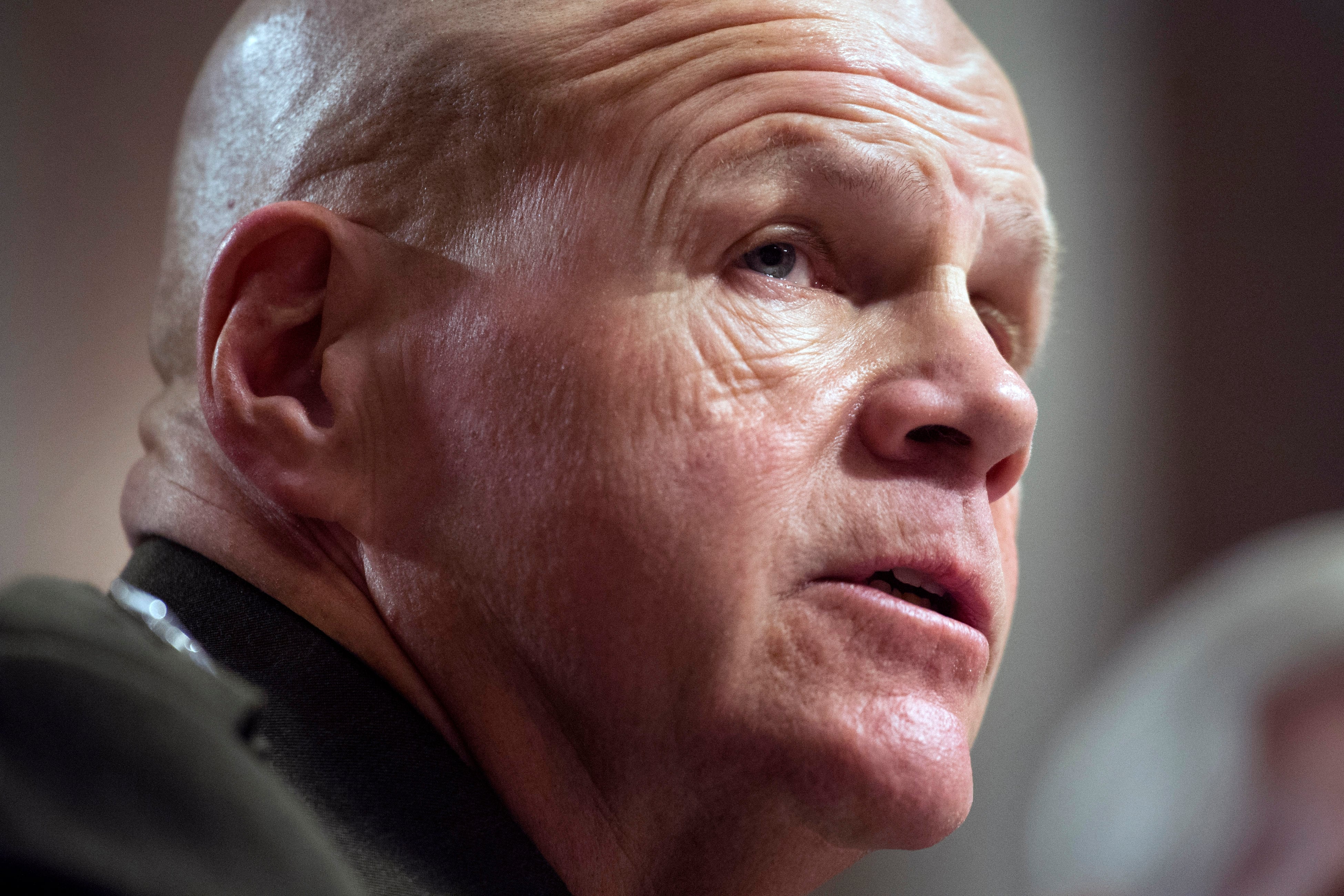The Marine Corps has always struggled with change.
A decade ago, when the Corps adopted new desert boots and the digital-pattern, wash-and-wear camouflage uniforms, many older Marines scoffed.
"They labeled us 'soft' and bitched about how in the 'old Corps' Marines knew the value of shining boots and starching cammies," recalled Ethan Field, a former Marine infantry squad leader and foreign affairs professional.
For the past 15 years, the Marine Corps has faced mounting pressure to modernize and adapt, responding to both a changing battlefield overseas and the civilian society's expectations back at home. While breaking with tradition has often made the Corps stronger, it also inspires frustration and scorn among the "old Corps."
"Every current Marine or former Marine resents that people coming after them will have it easier," Field said. They fear that "the lack of traditions they were raised on will somehow make new Marines 'less' than they were in the past."
The latest push for change is targeting the Corps' culture. It comes in response to revelations that hundreds, maybe thousands, of male Marines have been posting and viewing online photographs of naked female Marines without their consent. The scandal is shining a public spotlight on secretive online networks where Marines and others traffic in "revenge porn," and make jokes about domestic violence and sexual assault.
While the Corps' leaders have known about these sites for years, the latest uproar has forced the top generals to call for a sweeping crackdown. Top generals say Marines could be prosecuted under the Uniform Code of Military Justice. Boot camp and the hallowed process for making Marines is under review.
More broadly, Marine Commandant Gen. Robert Neller has vowed to stamp out the sexism and misogyny that for years was overlooked with a wink and a shrug.
"We're going to have to change how we see ourselves … how we treat each other." Neller told lawmakers on March 14 before a Senate hearing on the nude-photo sharing scandal rocking the Corps.
The commandant was even more blunt and stern in a video message speaking directly to Marines on March 7.
"If you can't or are unwilling to commit 100 percent to our Corps' warfighting ability by being a good teammate and improving cohesion and trust, then I have to ask you: Do you really want to be a Marine?"
The nude photo scandal has revealed to the public an age-old divide inside the Corps, where some Marines flatly reject the idea that the world's most respected warriors should be judged for behavior that is unfamiliar or unsettling to most civilians.
One former Marine and member of the Marines United website at the center of the scandal offered a forceful defense of Marines and the conduct under scrutiny.
"We were only created to fight and win wars. We're not some polite gentleman society. We are proud savages!" Travis Lee Hamrick told Marine Corps Times in an email.
"We love war, and we pray that we get selected for the combat deployments. Truth be told, we really just don't fit in with civilians, whining over which bathrooms to use in America. We certainly couldn't care less about politics anymore," said Hamrick, who spent ten years in the Corps, leaving as a corporal. He now lives in South Carolina.
"In short, those of us who served have our own breed of citizenship among a small elite group of savages. That being said, we just want to be left alone. You liberal hipsters just go drink your Starbucks lattes, and stay out of our lives," wrote Hamrick, who deployed to Iraq and Afghanistan a total of seven times as both a Marine and a civilian contractor.
It's clear that those Marines will not be left alone. The Naval Criminal Investigative Service is actively investigating whether Marines may have violated the UCMJ in sharing nude photos without the women's consent and harassing them online, So far, investigators have identified 1,200 members of Marines United, including 700 active-duty Marines and 150 Marines in the Reserve, Rep. Jackie Speier, of D-Calif., said at a news conference.
Many Marines believe their traditions and tightly knit culture is at the core of their strength. And for some, embracing sexism and misogynistic attitudes toward women makes them feel like they are living up to the Corps' tradition, said Maximilian Uriarte, a Marine veteran and the creator of the "Terminal Lance" comic strip.
"People say that: 'This is just how the Marine Corps is; this is how the Marine Corps has always been,'" Uriarte told Marine Corps Times. "But this behavior has never been seen before. Chesty Puller was not sharing nudes of female Marines on Facebook. There's no precedent for what this is.
"The idea that the Marine Corps is somehow weaker for not sharing nudes of women on Facebook — it's just stupid. It doesn't actually make sense. There's no logical connection, really, to it."
The Corps' conundrum
Change has been the problem for the Marine Corps, which has "the most traditional culture," according Nora Bensahel, an expert in security studies and leadership at American University.
For example, as the battlefields in Iraq and Afghanistan became more complex and evolved into counterinsurgency, the Marine Corps adopted more precision weapons, GPS and scoped weapon sites to provide Marines standoff distance to hit targets and provided more accurate fires to limit civilian casualties.
However, these changes did not come without ridicule and animosity within the Marine Corps. Older generation Marines saw the use of Trijicon ACOG weapon sites for the M4 and M16 rifle as pushing away from Marine Corps traditions of marksmanship that focused on old iron sites, despite the added benefit of increased accuracy a scoped optic provides.
The prolific use of GPS was seen as an assault on the basics of land navigation, and "old Corps" Marines believed that reliance on GPS would ruin future warfighters who would lose their compass navigation skills.
But in hindsight, the benefits of GPS-based weapons systems are all too obvious. They limit human error on the battlefield, increase casualty evacuations times by marking more accurate landing zones for helicopters, increased air strike lethality and accuracy, and allow Marines to navigate terrain more efficiently and in better time.
These changes have made the Corps stronger, more lethal and more professional, but pushback from older generation Marines is always constant.
But therein lies a major conundrum for the Marine Corps, Bensahel said, as it tries to rapidly adapt to a battlefield changing at "lightspeed" by near-peer adversaries like Russia and China. The Marine Corps has been resistant to change, despite the fact the organization fully understands that it needs to recruit top level talent to meet the needs of former Secretary of Defense Ashton Carter's Force of the Future initiative, and to remain formidable to rising adversaries like Russia and China.
The most important aspect of any military unit in the future will be its ability to adapt, something the Marine Corps has shown itself averse to, Bensahel said. The battlefield is highly dynamic and technological changes and new weapons are entering at light speed, which means the Marine Corps will need to be flexible in responding to these changes.
The nude-photo scandal that has consumed the Marine Corps' leadership for weeks is not simply a problem of social media misconduct, as some leaders suggest. It is a problem embedded deep within Marine Corps culture and attitudes, where resistance to change and a male-dominated culture is now threatening U.S. national security.
"I certainly think the recent scandals are going to affect the USMC's ability to increase the number of women they recruit, which has been a stated goal of the commandant in order to strengthen the force," said Amy Schafer, an expert in security studies at the Center for New American Security, a Washington D.C. think tank.
Women in the Corps
Officially, the Marine Corps and its leaders understand that they need to recruit and retain female Marines. They acknowledge that on the battlefield, women can operate in cultural spheres that are off-limits to men. At home, women offer the male-dominated institution a different perspective that can improve analysis and decision-making.
Yet in practice, some Marine say sexism persists.
"I personally had to re-evaluate why I was in," said a female military official with nearly 15 years in the Marine Corps, whose skill sets are critical to U.S. national security.
"Women are unwelcome in the Marines," one former female Marine told Marine Corps Times.
Trading photos of naked female Marines "is just a new avenue of trying to take their credibility," she said.
"Reading what these guys had to say about female Marines made me wonder if any of my accomplishments — if any of what I consider to be the most important events of my life — were a reality to anyone but me," she added.
Sen. Kirsten Gillibrand, D-N.Y., told the commandant that the Corps was lacking the cohesion and loyalty it claims to cherish. "It's a serious problem when we have members of our military denigrating female Marines, who will give their life to this country in the way they have, with no response from leadership," Gillibrand said during the hearing on the Hill.
But the Marines have been especially resistant to gender integration, a stark contrast to the other services that have changed their policy with little to no resistance from senior leaders or the rank and file force.
In 2015, then-Commandant Gen. Joseph Dunford formally asked for an exemption from the Pentagon policy of integrating women into combat units. He pointed to a Marine Corps-sponsored study that suggested women suffer injuries at higher rates and that gender-integrated combat units do not perform as well as all-male units.
The defense secretary rejected that request.
Bensahel said the Marine Corps made a mistake in seeking the women-in-combat waiver because it sent a message that the senior leaders stood behind the cultural belief that war was inherently more suited for men and that women can undermine combat readiness in some situations.
The Marine Corps is still the only branch of service with gender segregated boot camp, an issue that critics say creates double standards, feeds animosity toward female Marines, and creates an atmosphere hostile to proper unit cohesion.
"Dual standards will always create dissent among the members of an organization because it is inherent discrimination in one way or another," said a former Marine special operator.
The sexism highlighted by the online nude-photo scandal has reinvigorated calls to integrate boot camp more fully.
Sen. Elizabeth Warren, D-Mass., grilled Gen. Neller on whether ending the Marine practice of gender-segregated boot camp could solve some of the gender discrimination issues in the Marines. Neller's response was that the entire recruit training program was under review. But he stopped short of saying anything specific about gender integration.
The commandant rejected any connection between the psychological stress of combat and the sexism and cyberbullying of women that is now under scrutiny. What motivates those Marines to behave that way online is unclear, Neller told Congress.
"I've heard it described as the dark humor of veterans, but that's a cop-out," Neller said. "But we also know that there are Marines that are participating in this, who have never been shot at in their lives. So they're just trying to get credibility — I don't know."
Shawn Snow is the senior reporter for Marine Corps Times and a Marine Corps veteran.





